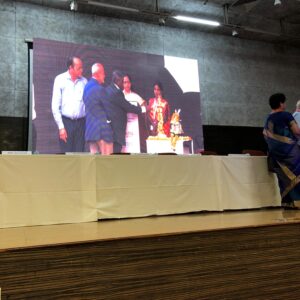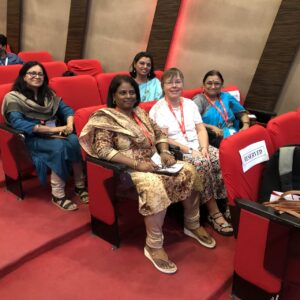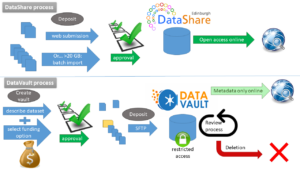Last week I was honoured to accept an invitation to speak at the Library Technology Conclave at Somaiya Vidyavihar University in Mumbai, India, organised by Informatics Limited and the University. A prelude the day before the event included a half-day “Research Data Management (RDM) Basics” tutorial for about 50 attending librarians, which I delivered based on adaptations of our Research Data Support team’s training materials for PhD students and staff. The training exercises, developed from a few other external librarian training sessions I’ve done, focused on building librarians’ confidence in supporting researchers with data management planning and data sharing. Doing the training in person helped me to overcome communication barriers and foster deeper engagement than could have happened online only.

Lighting the flame of the hybrid conference
The conference was on the theme of “Research Data Management and Stewardship: Building Blocks for Open Science,” with a number of eminent librarians, scientists, and educators speaking in keynotes and on panels in six thematic sessions, in-person and remotely. There was a palpable sense of urgency to the proceedings, as those in the room were concerned that India’s scientific institutions, without funder mandates, national open infrastructure, nor observable changes in cultural norms for RDM and Open Science, might be left behind, given this emerging new, more transparent way of conducting research. Questions focused not on the What or Why of Open Science, but how to instigate behavioural change of scientists and researchers, and how librarians could create demand for new services such as data repositories and quickly skill themselves up.
I have some empathy for their position. A decade or so ago I attended conferences which felt more like hand-wringing than change-making, with endless talk of carrots and sticks (and carrot-stick jokes), with researchers explaining over and again their reluctance to be ‘scooped’ by giving access to their data. I am not sure what caused the tipping point to talking about the potential of data sharing and open science to the exciting reality of it happening, but it seems to have come round (more or less). I do still harbour concerns that our own researchers will be left out of participation in the shared infrastructure that is the European Open Science Cloud because of Brexit-related barriers here.
 One talk that piqued my interest involved a survey of librarians in Gujarat about RDM and their capacity to deliver new types of service, by Dr. Bhakti Gala. As the Indian LIS (library and information science) curriculum was apparently seen to not be delivering RDM training to any great extent yet, the researcher had asked how the librarians had acquired knowledge of RDM. She said that about half the librarians who had pursued self-training had learned from the free, online MANTRA course (which stands for Research Data Management Training), offered by the University of Edinburgh.
One talk that piqued my interest involved a survey of librarians in Gujarat about RDM and their capacity to deliver new types of service, by Dr. Bhakti Gala. As the Indian LIS (library and information science) curriculum was apparently seen to not be delivering RDM training to any great extent yet, the researcher had asked how the librarians had acquired knowledge of RDM. She said that about half the librarians who had pursued self-training had learned from the free, online MANTRA course (which stands for Research Data Management Training), offered by the University of Edinburgh.
The Chair of the panel, Prof Shalini Urs, with whom I had had a conversation over dinner with about the name of the course, said [naming me, as I sat in the audience] that I would be happy to hear that was the case, to which I of course smiled and nodded. Alluding to our prior conversation about whether the name was a cultural [mis-]appropriation or not, she looked me in the eye and said, “It is Our MANTRA, now.” Which is, of course, the great thing about Openness.
 One of the ambitions for the EOR conference held in March, 2022, when we first started planning it was to make it as open and accessible as possible. To achieve this we made the whole event hybrid so that plenary talks, posters, and workshops were all accessible on the day to both in person and remote attendees. While this generally worked very well for both remote and in-person attendees, we also wanted to make it available to people who couldn’t attend on the day – so we recorded everything, and the recordings of the talks and posters can now be openly accessed through our Edinburgh Open Research journal at http://journals.ed.ac.uk/eor.
One of the ambitions for the EOR conference held in March, 2022, when we first started planning it was to make it as open and accessible as possible. To achieve this we made the whole event hybrid so that plenary talks, posters, and workshops were all accessible on the day to both in person and remote attendees. While this generally worked very well for both remote and in-person attendees, we also wanted to make it available to people who couldn’t attend on the day – so we recorded everything, and the recordings of the talks and posters can now be openly accessed through our Edinburgh Open Research journal at http://journals.ed.ac.uk/eor.


 One talk that piqued my interest involved a survey of librarians in Gujarat about RDM and their capacity to deliver new types of service, by Dr. Bhakti Gala. As the Indian LIS (library and information science) curriculum was apparently seen to not be delivering RDM training to any great extent yet, the researcher had asked how the librarians had acquired knowledge of RDM. She said that about half the librarians who had pursued self-training had learned from the free, online
One talk that piqued my interest involved a survey of librarians in Gujarat about RDM and their capacity to deliver new types of service, by Dr. Bhakti Gala. As the Indian LIS (library and information science) curriculum was apparently seen to not be delivering RDM training to any great extent yet, the researcher had asked how the librarians had acquired knowledge of RDM. She said that about half the librarians who had pursued self-training had learned from the free, online 
